Fossil Records
Fossil records are the preserved remains or traces of animals, plants, and other organisms from the remote past. These remnants are found in sedimentary rock and can provide valuable information about the history of life on Earth.
Types of Fossils
There are several types of fossils:
- Body Fossils: These are the actual remains of an organism, such as bones, teeth, or shells.
- Trace Fossils: These are indirect evidence of ancient life, such as footprints, burrows, or fossilized dung.
- Cast Fossils: These form when a mold of an organism is filled with minerals, creating a replica of the original organism.
Formation of Fossils
Fossils are formed through a process called fossilization:
- Death and Burial: The organism dies and its remains are buried by sediment, protecting them from decay and scavengers.
- Mineralization: Over time, the organic matter in the remains is replaced by minerals, turning them into stone.
- Exposure: Erosion or human activity may expose the fossil, allowing it to be discovered and studied.
Uses of Fossil Records
Fossil records have several important uses:
- Evidence of Evolution: Fossils provide evidence for the process of evolution and the history of life on Earth.
- Climate Change Studies: Fossils can indicate past climates and environmental changes, helping scientists understand current and future climate patterns.
- Geological Dating: Fossils are used to date rock layers and determine the age of the Earth's crust.
Study Guide
Here are some key points to remember about fossil records:
- What are the different types of fossils and how are they formed?
- How do fossils provide evidence for the theory of evolution?
- What can fossils tell us about past climates and environmental changes?
- Why are fossils important for understanding the history of the Earth?
Understanding fossil records can provide valuable insights into the history of life on Earth and the processes that have shaped our planet over millions of years.
.◂Science Worksheets and Study Guides Third Grade. Hands-on Lab Skills/Science Inquiry - 3rd grade
Study Guide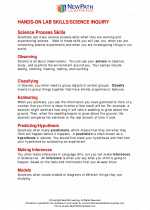 Hands-on Lab Skills/Science Inquiry - 3rd grade
Hands-on Lab Skills/Science Inquiry - 3rd grade  Worksheet/Answer key
Worksheet/Answer key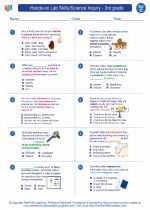 Hands-on Lab Skills/Science Inquiry - 3rd grade
Hands-on Lab Skills/Science Inquiry - 3rd grade  Worksheet/Answer key
Worksheet/Answer key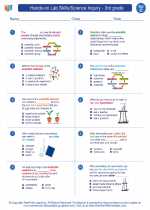 Hands-on Lab Skills/Science Inquiry - 3rd grade
Hands-on Lab Skills/Science Inquiry - 3rd grade  Worksheet/Answer key
Worksheet/Answer key Hands-on Lab Skills/Science Inquiry - 3rd grade
Hands-on Lab Skills/Science Inquiry - 3rd grade  Worksheet/Answer key
Worksheet/Answer key O-W-L
O-W-L  Vocabulary/Answer key
Vocabulary/Answer key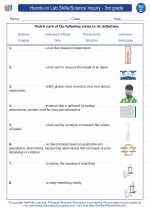 Hands-on Lab Skills/Science Inquiry - 3rd grade
Hands-on Lab Skills/Science Inquiry - 3rd grade  Vocabulary/Answer key
Vocabulary/Answer key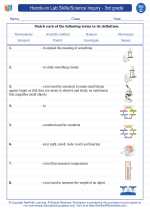 Hands-on Lab Skills/Science Inquiry - 3rd grade
Hands-on Lab Skills/Science Inquiry - 3rd grade 

 Worksheet/Answer key
Worksheet/Answer key
 Worksheet/Answer key
Worksheet/Answer key
 Worksheet/Answer key
Worksheet/Answer key
 Worksheet/Answer key
Worksheet/Answer key
 Vocabulary/Answer key
Vocabulary/Answer key
 Vocabulary/Answer key
Vocabulary/Answer key

The resources above cover the following skills:
Science as Inquiry and Process: A student should understand and be able to apply the processes and applications of scientific inquiry. A student who meets the content standard should:
Develop an understanding of the processes of science used to investigate problems, design and conduct repeatable scientific investigations, and defend scientific arguments.